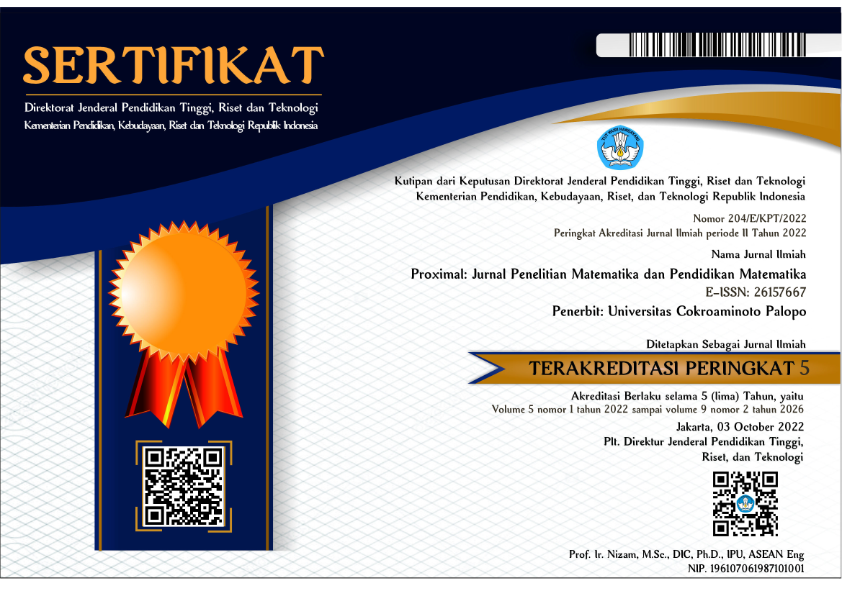PROFESSIONAL COMPETENCE: MATHEMATICS CONTENT KNOWLEDGE MAHASISWA CALON GURU PADA MATA KULIAH ANALISIS KURIKULUM MATEMATIKA
Abstract
Penelitian ini merupakan penelitian kualitatif deskriptif dengan metode studi kasus, yaitu mengamati dan menganalisis fenomena-fenomena tertentu yang terjadi pada subjek yang diteliti. . Penelitian ini bertujuan untuk mengetahui mathematics content knowledge mahasiswa calon guru yang memprogram mata kuliah analisis kurikulum matematika. Penelitian ini dilaksanakan di Program Studi Pendidikan Matematika, Fakultas Keguruan dan Ilmu Pendidikan, Universitas Cokroaminoto Palopo (UNCP). Penelitian ini dilaksanakan pada semester ganjil tahun akademik 2019/2020, pada bulan Oktober-Desember 2019. Subjek dalam penelitian ini adalah mahasiswa yang memprogram mata kuliah analisis kurikulum matematika yaitu mahasiswa pada semester lima. Instrumen yang digunakan dalam penelitian ini adalah lembar observasi dan dokumentasi. Pengetahuan konten matematika (mathematics content knowledge) yang dimaksudkan dalam penelitian ini adalah pengetahuan factual, pengetahuan konseptual, dan pengetahuan prosedural mahasiswa calon guru terhadap materi matematika yang diajarkannyaBerdasarkan hasil penelitian dan pembahasan maka dapat disimpulkan bahwa tidak semua mahasiswa memiliki mathematics content knowledge yang baik. Setiap mahasiswa pasti memiliki kelemahan, apakah kelemahan dipengetahuan faktualnya, konseptualnya, atau dipengetahuan proseduralnya.
Downloads
References
Dirjen Sumber Daya Iptek Dikti. (2019). Hardiknas 2019, Saatnya Indonesia Memiliki SDM Kompetitif, Inovatif, dan Berkarakter. Retrieved from sumberdaya.ristekdikti: http://sumberdaya.ristekdikti.go.id/index.php/2019/05/02/hardiknas-2019-saatnya-indonesia-miliki-sdm-kompetitif-inovatif-dan-berkarakter/. Diakses pada tanggal 04 Februari 2020.
Fajar, I. (2012). Empat Kompetensi yang Harus Dimiliki oleh Seorang Guru Profesional. Retrieved from ibnufajar75. https://ibnufajar75.wordpress.com/2012/12/27/empat-kompetensi-yang-harus-dimiliki-seorang-guru-profesional/. Diakses pada tanggal 04 Februari 2020.
Hakim, A. (2015). Contribution of competence Teacher (Pedagogical, Personality, Professional Competence and Social) on the Performance of Learning. The International Journal of Engineering and sciences (IJES). Volume 4, Issue 2, PP.01-12. ISSN (e): 2319-1813.
Kaniawati, Utari, & Suyana. (2007). Profil kemampuan Mengajar Calon Guru Fisika dalam Program Pengalaman Lapangan (PPL). Jurnal Pengajaran MIPA, Vol. 10 No.2 Hal:21-35, Desember 2007. ISSN.1412-0917.
Purnomo, Y. W. (2017). Menjadi Guru Matematika: antara Peluang, Harapan, Tuntutan dan Tantangan. Conference Paper, disampaikan pada kuliah umum dengan tema “Peran Guru Matematika dalam Persaingan Global” di Program studi Pendidikan Matematika Universitas Muhammadiyah Surakarta, tanggal 6 November 2017.
Salwah. (2018). Habit of Striving for Accuracy and Precision (HSAP) melalui Pendekatan Realistic Mathematics Education Berbasis Gaya Kognitif. Jurnal Pedagogy 3(1) Page 118-155.
Sugiman, Kusumah, & Sabandar. (2009). Pemecahan Masalah Matematik dalam Matematika Realistik. http://staff.uny.ac.id/sites/default/files/131930135/2009a_PM_dalam_PMR.pdf
Sulfemi, W B. (2016). Kompetensi Profesionalisme Guru dalam Menghadapi MEA. Prosiding Seminar Nasional STKIP Muhammadiyah Bogor,, ISSN 977-2443-247-02, pp 62-77.
Yang, Yang, Liu, Xiufeng, Gardella, Joseph A. (2018). Effects of Professional Development on Teacher Pedagogical Content Knowledge, Inquiry Teaching Practices, and Student Understanding of Interdisciplinary Science. Journal of Science Teacher Education, DOI: 10.1080/1046560X.2018.1439262
Downloads
Published
How to Cite
Issue
Section
License
In submitting the manuscript to the journal, the authors certify that:
- They are authorized by their co-authors to enter into these arrangements.
- The work described has not been formally published before, except in the form of an abstract or as part of a published lecture, review, thesis, or overlay journal.
- That it is not under consideration for publication elsewhere,
- That its publication has been approved by all the author(s) and by the responsible authorities – tacitly or explicitly – of the institutes where the work has been carried out.
- They secure the right to reproduce any material that has already been published or copyrighted elsewhere.
- They agree to the following license and copyright agreement.
License and Copyright Agreement
Authors who publish with this journal agree to the following terms:
- Authors retain copyright and grant the journal right of first publication with the work simultaneously licensed under Creative Commons Attribution License (CC BY 4.0) that allows others to share the work with an acknowledgment of the work's authorship and initial publication in this journal.
- Authors are able to enter into separate, additional contractual arrangements for the non-exclusive distribution of the journal's published version of the work (e.g., post it to an institutional repository or publish it in a book), with an acknowledgment of its initial publication in this journal.
- Authors are permitted and encouraged to post their work online (e.g., in institutional repositories or on their website) prior to and during the submission process, as it can lead to productive exchanges, as well as earlier and greater citation of published work.















